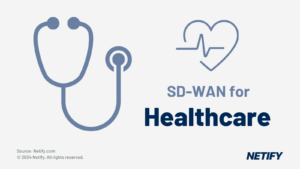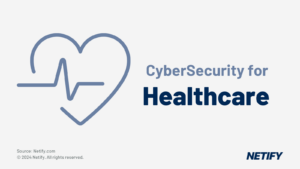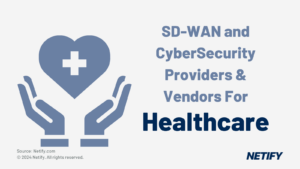| SD-WAN deployments in healthcare improve network reliability, security, and patient care across various institutions. |
For the healthcare industry, it is essential that the network infrastructure is continuously reliable and secure, due to being critical to improving the quality of patient care and providing uninterrupted operations. One way to achieve this is for healthcare organisations to leverage Software Defined Wide Area Network (SD-WAN) solutions.
In this article we look into case studies from the healthcare industry across both the UK and North America, exploring how SD-WAN was deployed to address challenges and their outcomes.
UK Case Studies
When deploying SD-WAN solutions across the UK, healthcare providers have to consider regulatory requirements such as the General Data Protection Regulation (GDPR) to ensure the security and confidentiality of patient data.
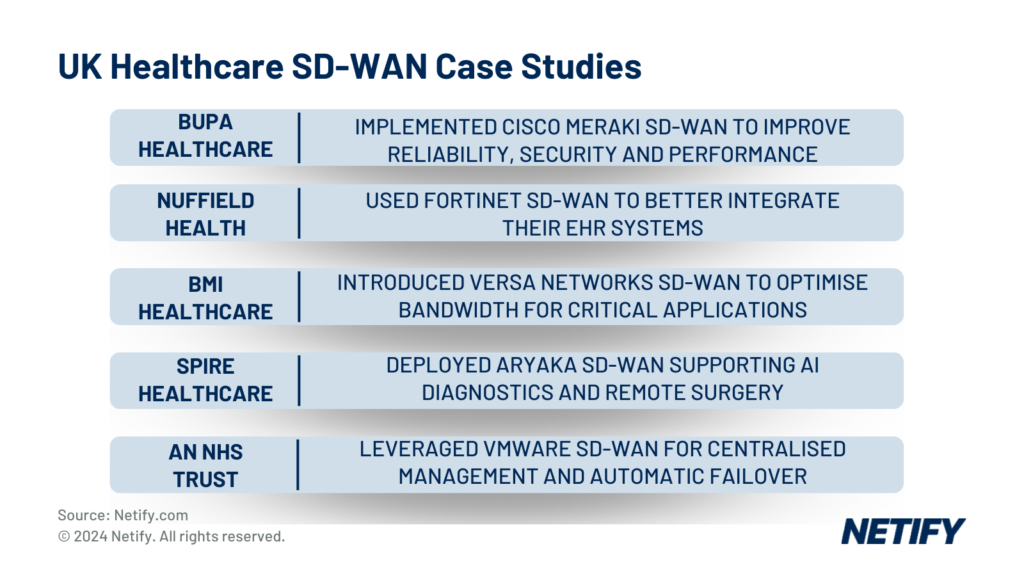
- UK Healthcare SD-WAN Deployment Case Studies
Bupa Health Clinics
Bupa Healthcare is a leading international healthcare company providing private health insurance, care homes, and health services. To improve their network reliability and security across multiple locations, Bupa deployed Cisco Meraki SD-WAN, which ensured consistent application performance for their cloud-based health management systems. This consistency significantly improved patient care and operational efficiency, whilst also providing Bupa with better network visibility and control, allowing for more efficient management of their IT resources and improved data security measures.
With Cisco Meraki SD-WAN, Bupa was able to prioritise critical healthcare applications, ensuring that bandwidth was always available for essential services such as patient records, telemedicine, and diagnostic imaging. By prioritising crucial applications and services, Bupa reduced latency and improved the user experience across their healthcare offerings, benefitting both healthcare professionals and patients.
Implementing Meraki SD-WAN also offered Bupa with centralised management capabilities, enabling Bupa to quickly identify and respond to network issues, minimising downtime, ensuring that healthcare services remained uninterrupted and enabled proactive monitoring for protecting against potential future issues. The flexibility of Meraki SD-WAN was essential for deployment over multiple locations, as Bupa required their network to be easily scalable to accommodate new clinics and services and able to accommodate an ongoing expansion of applications and services.
As Cisco Meraki is well-known for being ideal for large infrastructures and scale, this was ideal for Bupa and was able to successfully meet their demands.
Nuffield Health
Like Bupa, Nuffield Health are one of the UK’s leading healthcare organisations, however, differs by being not-for-profit. Nuffield adopted a Fortinet SD-WAN solution in order to integrate their numerous healthcare facilities, providing a seamless and secure connection for their electronic health record (EHR) systems. Integrating Nuffield’s EHR systems has been integral for improved sharing of data and collaboration amongst healthcare professionals, allowing for better patient care from distributed systems and locations.
Introducing Fortinet SD-WAN also enhanced Nuffield Health’s ability to manage and secure their network, with features such as encryption and segmentation, each of these improve the confidentiality and integrity of sensitive patient data by protecting it from breaches. This was essential for Nuffield Health to remain compliant with the General Data Protection Regulation (GDPR), amongst other regulatory requirements.
Utilising Fortinet SD-WAN improved Nuffield Health’s network performance, which was required to implement advanced healthcare technologies such as AI-driven diagnostics and telehealth services, which enhance the quality of care provided to patients. Further to this, Nuffield Health were able to use SD-WAN to reduce their operational costs by consolidating their network infrastructure and eliminating the need for expensive legacy systems. The scalability of Fortinet SD-WAN also allowed Nuffield Health to quickly respond to changing healthcare demands, such as the need for additional bandwidth during peak times and the rapid deployment of new clinics.
BMI Healthcare
BMI Healthcare, a network of private hospitals in the UK, implemented Versa Networks SD-WAN to improve the performance and reliability of their critical healthcare applications. One of the core features BMI Healthcare leveraged was Versa SD-WAN’s ability to manage network traffic dynamically. This ensured that network bandwidth was optimally allocated to the most important applications, such as their patient management system and telemedicine services.
Whilst the allocation of resources is essential for improving application performance, more importantly for BMI Healthcare was enhanced redundancy and failover capabilities to ensure that their systems experience no downtime, even in the event of a connection failure. This high level of reliability was critical for maintaining the quality of care and ensuring that patients received timely and accurate diagnoses and treatments.
Similarly to Bupa, BMI Healthcare utilised the centralised management platform of SD-WAN to streamline their IT operations, reducing the complexity and cost of managing multiple network connections. This management platform provided their network administration team with detailed analytics and reporting, enabling BMI Healthcare to utilise telemetry and insights into network performance and usage patterns. This data allows optimisation of network resources, sets the foundations for future growth and ensures that their network can support emerging healthcare technologies such as remote patient monitoring and AI-driven analytics.
Spire Healthcare
Another private hospital group within the UK, Spire Healthcare, implemented Aryaka SD-WAN to address challenges related to network performance and security. The enhanced network capabilities allowed Spire Healthcare to offer more reliable and secure healthcare services, leading to better patient care. The deployment of Aryaka SD-WAN enabled Spire Healthcare to integrate their various locations into a unified network, ensuring that healthcare professionals could easily access and share patient information regardless of their location. This integration improved collaboration and communication among healthcare teams, leading to more coordinated patient care.
The improved network performance capabilities of Aryaka SD-WAN were also essential for enabling Spire Healthcare to implement healthcare services such as AI-assisted diagnostics and remote surgery. This, alongside the scalability and flexibility of Aryaka SD-WAN allowed Spire Healthcare to quickly adapt to changing healthcare needs, such as the increased demand for telehealth services during the COVID-19 pandemic.
UK National Health Service (NHS) Trust
A National Health Service (NHS) Trust that manages multiple healthcare facilities needed a network solution that improved security, scalability and protected practices from network interruptions. These targets were defined by the NHS Trust’s requirement to protect patient data, comply with healthcare regulations, connect new sites to accommodate growing network demands and maintain uninterrupted service with high availability for 24/7 healthcare delivery operations. Due to managing multiple facilities, it was also essential for the NHS Trust to integrate a solution that offered centralised management through a single pane.
To address these challenges, the NHS Trust implemented VMware’s SD-WAN solution, which offers centralised monitoring and management for simplified administration processes, best-in-class security capabilities including firewalls, segmentation and integrations with leading security vendors. VMware SD-WAN also provided the NHS Trust with automatic failover and dynamic multi-path functionality, preventing interruptions to connectivity for improved patient care and telemedicine, whilst zero-touch provisioning capabilities allowed for rapid deployment of new sites and services.
By introducing the security of VMware SD-WAN, the NHS Trust was able to maintain compliance with regulations, whilst also allowing the Trust to quickly connect new sites securely. The successful implementation of VMware SD-WAN enabled the NHS Trust to build a reliable, secure, and more efficient network infrastructure, which improved overall delivery of patient care and outcomes across its healthcare facilities.
North American Case Studies
In North America, healthcare providers must adhere to healthcare regulations, such as the Health Insurance Portability and Accountability Act (HIPAA) to protect patient information.
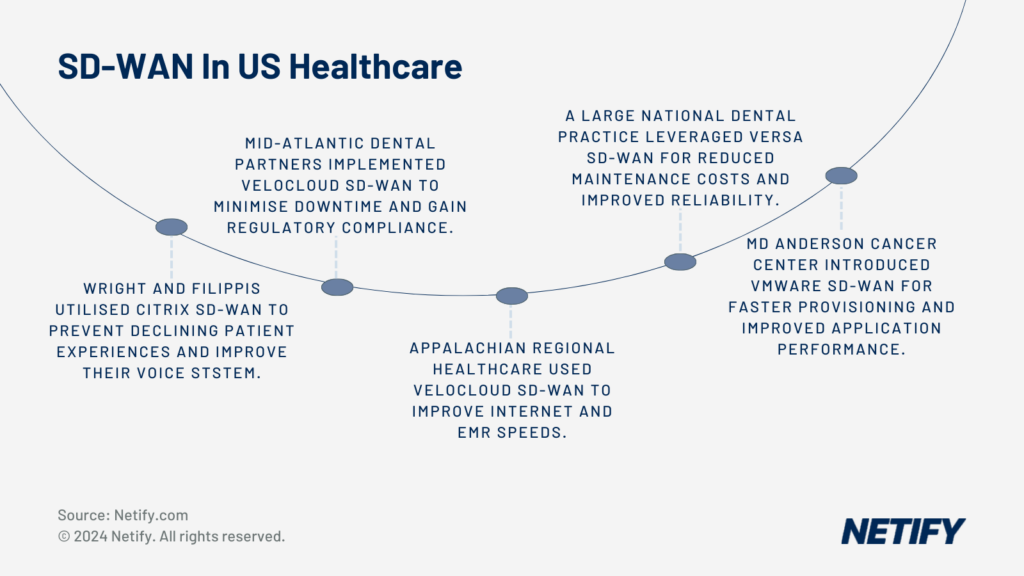
SD-WAN in US Healthcare Case Studies
Wright & Filippis
A leading provider of prosthetics, orthotics and accessibility solutions, Wright and Filippis have over 76 years of experience dedicated to improving patients’ lives by supporting them to regain their mobility and independence. Unfortunately for Wright and Filippis, their longstanding network infrastructure for 32 clinics had begun to experience slow internet speeds and poor electronic medical record (EMR) application performance, which were critical for day-to-day operations. Whilst their legacy infrastructure was experiencing these issues, their end-of-life voice system had also become rather difficult to manage, leading to a decline in patient experiences.
To address these issues, Wright & Filippis deployed a Citrix SD-WAN solution, which not only improved their network reliability but virtually eliminated outages, providing faster internet speeds and application performance, especially for critical EMR systems.
The branch and remote connectivity options provided by Citrix SD-WAN simplified network management and troubleshooting across the 32 clinics, reducing costs compared to their old traditional WAN infrastructure and made sure that call experiences for patients could utilise more reliable voice services.
With an improved network architecture in place, Wright & Filippis were able to overcome the issues experienced with their legacy system and focus on their primary goal of providing life-changing prosthetic, orthotic and accessibility solutions to help patients regain mobility and independence.
Mid-Atlantic Dental Partners (MADP)
The Mid-Atlantic Dental Partners (MADP) is a leading dental service organisation dedicated to providing accessible dental care. With a growing network of dental offices, MADP faced significant challenges in maintaining a stable and secure network infrastructure.
MADP utilised a legacy network, which suffered from frequent outages that disrupted operations and impacted the delivery of patient care. They often faced unreliable connectivity, bandwidth limitations for critical applications and issues with data sharing and security, which were essential for HIPAA compliance. These challenges hindered MADP’s ability to provide their dental services and were concerned with their ability to protect their patients’ sensitive data.
To address these challenges, MADP implemented Velocloud SD-WAN,, providing them with seamless failover, dynamic network routing, Quality of Service (QoS) management and enhanced security capabilities. These features minimised the downtime MADP’s services experience, helped to maintain HIPAA compliance through safeguarding patient data and, by leveraging QoS management, allocated network bandwidth to critical applications to prevent limitations or slower application speeds.
Appalachian Regional Healthcare (ARH)
Appalachian Regional Healthcare (ARH) is the largest provider of healthcare in South-Eastern Kentucky and operates a network of over 100 hospitals, clinics, pharmacies, and home health operations. With more than 400,000 lives depending on their services, ARH were concerned with meeting the network demands of continuous patient care across all of these locations and minimising potential downtime.
This is primarily due to ARH experiencing frequent network outages, which caused disrupted operations and patient care, whilst insufficient bandwidth meant that the network could not support their new Electronic Medical Records (EMR) system. It was also noted that, due to the volume of locations and dependent lives with a vast array of different network systems, network administration and management had become a complex job.
These issues hindered ARH’s ability to deliver optimal care to their patients and so, to address these challenges, ARH deployed VMware Velocloud SD-WAN, providing with them with high network availability, failover functionality and improved bandwidth.
The Velocloud SD-WAN service enabled proactive monitoring and optimisation of the network for ensuring the network performance did not deteriorate, dual access active/active connectivity at each location for redundancy and failover mechanisms, alongside high-bandwidth ethernet to mitigate the issues with inadequate bandwidth.
ARH, with the assistance of SD-WAN, has achieved virtually zero network downtime, ensuring uninterrupted patient care, improved application performance such as faster access to EMR records and gained real-time visibility into bandwidth allocation and utilisation across their larger bandwidth capacity ethernet connections.
National Dental Practice
A large national dental practice providing dentistry and orthodontics to patients of all ages faced significant challenges with their legacy network infrastructure. As the practice rapidly expanded to 41 offices, they needed to ensure WAN resiliency, high availability, and security compliance across all locations.
The dental practice required their network to be capable of supporting direct internet access, hosted voice, data storage, and critical applications across all 41 offices, whilst almost maintaining high availability and reliable connectivity, especially in more remote locations where available connections are limited. As per regulations, they also needed a solution that could handle the management of HIPAA compliance requirements across their offices, despite being nationally distributed.
To address these challenges, the dental practice implemented a managed Versa SD-WAN architecture. Versa SD-WAN provided the dental practice with centralised orchestration and management of all 41 offices via a single pane, reducing the complexity and workload for network administrators and keeping the network consistent across all sites. The increased bandwidth capacity through load sharing and aggregation across multiple connections, coupled with seamless failover mechanisms ensured that network connections were more reliable and services had high availability. Versa SD-WAN also offered automated data management for simplified compliance processes and multi-tenancy features for micro-segmentation and unique policies per office.
By replacing their legacy infrastructure with Versa SD-WAN, the national dental practice achieved a 40% reduction in maintenance and support costs, doubled the bandwidth capacity per office through intelligent traffic steering, gained a 60% improvement in network reliability with automated failover and were able to leverage 100% automated processes for data and compliance management.
MD Anderson Cancer Center
Finally, MD Anderson Cancer Center is a world-renowned cancer treatment and research institution, which is both a degree-granting academic centre and a comprehensive cancer treatment facility. With faculty and staff spread across more than 25 buildings across Texas, MD Anderson is one of the largest cancer centres globally.
Due to their legacy network infrastructure, MD Anderson has experienced poor application performance, especially for bandwidth-intensive radiology imaging files, slow and inflexible provisioning of new sites and services, inadequate security measures for protecting sensitive patient data and an inability to support remote work during the COVID-19 pandemic.
These issues hindered MD Anderson’s ability to deliver quality care to its patients and operate with optimal efficiency and so to address these challenges, MD Anderson partnered with VMware to implement their SD-WAN solution across more than 200 remote offices.
VMware SD-WAN provided MD Anderson with application-aware traffic steering and per-application QoS for improved application performance and prioritisation of crucial services such as radiology imaging files. This meant that MD Anderson could perform an increased number of radiology scans per day, enhancing diagnostic efficiency and decreasing time-to-billing for radiology services.
The centralised management pane and scalability offered by VMware SD-WAN enabled rapid deployment of secure remote connectivity for employees during the pandemic, whilst network administrators could monitor network resiliency and security from this platform.
With VMware SD-WAN, MD Anderson gained the network performance, agility, and security needed to deliver exceptional patient care and advance its cancer research initiatives.
